| Listing 1 - 10 of 11 | << page >> |
Sort by
|
Book
Year: 2015 Publisher: London, England : Academic Press,
Abstract | Keywords | Export | Availability | Bookmark
 Loading...
Loading...Choose an application
- Reference Manager
- EndNote
- RefWorks (Direct export to RefWorks)
The Wechsler Intelligence Scale is the most widely used intelligence test for children worldwide. WISC-V introduces new subtests, composite scores, process scores, error scores, and scaled scores as a more complex and accurate means of assessing cognitive abilities. WISC-V Assessment and Interpretation provides practical information for clinicians on selection of subtest measures, administration, and interpretation. New subtests are described along with tips for accurate administration and scoring. Full Scale IQ is identified as important for predicting relevant behaviors, and primary inde
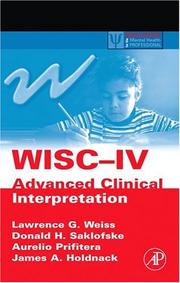
ISBN: 1280707569 9786610707560 0080466117 0120887630 1493300040 9780120887637 9780080466118 9781280707568 Year: 2006 Publisher: Burlington, MA : Academic Press/Elsevier,
Abstract | Keywords | Export | Availability | Bookmark
 Loading...
Loading...Choose an application
- Reference Manager
- EndNote
- RefWorks (Direct export to RefWorks)
For both experienced psychologists and graduate students, this book moves quickly through the essentials of WISC-IV interpretation and onto an insightful analysis of the major cognitive domains assessed by WISC-IV. It is the intention of the editors to raise the standard of practice from a simplistic 'test-label-place' model to a clinical model of assessing to understand and intervene. In the first chapter, the reader is presented with a comprehensive array of societal and home environment factors for which there is empirical evidence indicating their impact on the development of children's co
Wechsler Intelligence Scale for Children. --- WISC (Intelligence test) --- Children --- Intelligence testing
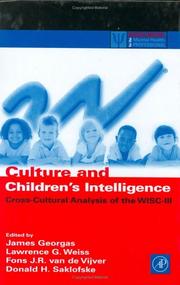
ISBN: 1417562099 9781417562091 1592784763 9781592784769 0080488617 9780080488615 9786610927043 6610927049 0122800559 9780122800559 1280927046 Year: 2003 Publisher: Amsterdam Academic Press
Abstract | Keywords | Export | Availability | Bookmark
 Loading...
Loading...Choose an application
- Reference Manager
- EndNote
- RefWorks (Direct export to RefWorks)
This book provides a unique cross-cultural perspective of the WISC-III. From construction, translation and adaptation in different cultures, to analysis of its structure and function as a concept, to its clinical use with different ethnic groups, Culture and Children's Intelligence provides clinician's the tools they need when using the WISC-III. The focus of this reference work is on children's intelligence as measured by the WISC-III in different cultures and its use in these cultures (USA, UK, Canada, France, Belgium, Germany, Austria, Switzerland, Sweden, and Greece). It also discu
Sociology of culture --- Intelligentie --- Psychologie --- Pedagogiek --- Cultuur --- Gedragstherapie --- Wechsler Intelligence Scale for Children --- #PBIB:2003.4 --- #KVHB:Cross-culturele psychologie --- #KVHB:Intelligentietests --- #KVHB:WISC-III NL --- WISC (Intelligence test) --- Children --- Intelligence testing --- Intelligence testing.
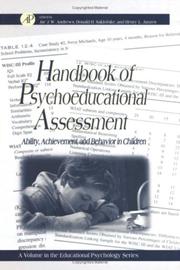
ISBN: 0120585707 9780120585700 9780080533803 0080533809 6611032584 9786611032586 1281032581 9781281032584 Year: 2001 Publisher: San Diego : Academic Press,
Abstract | Keywords | Export | Availability | Bookmark
 Loading...
Loading...Choose an application
- Reference Manager
- EndNote
- RefWorks (Direct export to RefWorks)
The Handbook of Psychoeducational Assessment is a practical guide for educational and psychological professionals using norm-referenced tests in the ability, achievement, and behavioral assessment of children. Written by key individuals involved in the construction and evolution of the most widely used tests, this book provides critical information on the nature and scope of commonly used tests, their reliability and validity, administration, scoring and interpretation, and on how the tests may differ and complement each other in their utility with specific populations.Part 1 of
Educational psychology --- Educational tests and measurements --- Intelligence tests --- Intelligence levels --- Intelligence testing --- IQ tests --- Mental tests --- Psychological tests --- Testing
Book
ISBN: 0128021101 0128020768 9780128021101 9780128020760 Year: 2016 Publisher: Amsterdam, [Netherlands] : Academic Press,
Abstract | Keywords | Export | Availability | Bookmark
 Loading...
Loading...Choose an application
- Reference Manager
- EndNote
- RefWorks (Direct export to RefWorks)
"WJ IV Clinical Use and Interpretation: Scientist-Practitioner Perspectives provides clinical use and interpretive information for clinical practitioners using the Woodcock-Johnson, Fourth Edition (WJ IV). The book discusses how the cognitive, achievement, and oral language batteries are organized, a description of their specific content, a brief review of their psychometric properties, and best practices in interpreting scores on the WJ IV. Coverage includes the predictive validity of its lower order factors and the clinical information that can be derived from its 60 individual subtests. Part II of this book describes the clinical and diagnostic utility of the WJ IV with young children for diagnosing learning disabilities in both school age and adult populations, and for identifying gifted and talented individuals. Additionally, the book discusses the use of the WJ IV with individuals whose culture and language backgrounds differ from those who are native English speakers and who were born and raised in mainstream US culture"--Provided by publisher.
Woodcock-Johnson Tests of Cognitive Ability. --- WJTCA (Psychology) --- Cognition --- Intelligence tests --- Testing --- Intelligence levels --- Intelligence testing --- IQ tests --- Mental tests --- Psychological tests
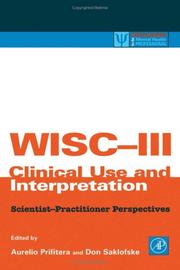
ISBN: 9780125649308 0125649304 9780080521206 0080521207 9786610927364 1280927364 Year: 1998 Publisher: San Diego London : Academic Press,
Abstract | Keywords | Export | Availability | Bookmark
 Loading...
Loading...Choose an application
- Reference Manager
- EndNote
- RefWorks (Direct export to RefWorks)
The WISC-III is the most frequently used IQ assessment technique in the United States. This book discusses the clinical use of the WISC-III with respect to specific clinical populations, and covers research findings on the validity and reliability of the test. It also includes standardization data from the Psychological Corporation. Many of the contributors participated in the development of the WISC-III and are in a unique position to discuss the clinical uses of this measure. The book describes the WISC-III from scientist-practitioner perspectives. It provides methods to aid in understan
Wechsler Intelligence Scale for Children. --- Intelligence tests --- Intelligence levels --- Intelligence testing --- IQ tests --- Mental tests --- Psychological tests --- WISC (Intelligence test) --- Children --- Testing
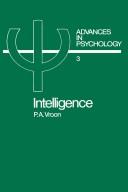
ISBN: 0444854657 9786611797119 1281797111 0080866573 9780080866574 9780444854650 9781281797117 6611797114 Year: 1980 Volume: 3 Publisher: Amsterdam New York New York North-Holland Pub. Co. Sole distributors for the U.S.A. and Canada, Elsevier North-Holland
Abstract | Keywords | Export | Availability | Bookmark
 Loading...
Loading...Choose an application
- Reference Manager
- EndNote
- RefWorks (Direct export to RefWorks)
Presenting a philosophical and psychological overview of the history of the concept of intelligence, this controversial text does not aim to supply yet another opinion on, or interpretation of the concept of intelligence, but rather attempts to find out how to approach this concept on a scientific level.
Intelligence --- Intelligence Tests --- Intellect --- Intelligence tests --- Tests --- Intellect. --- Intelligence. --- Intelligence Tests. --- Intelligence tests. --- Intelligence levels --- Intelligence testing --- IQ tests --- Mental tests --- Psychological tests --- Human intelligence --- Mind --- Ability --- Psychology --- Thought and thinking --- Testing
Periodical
Abstract | Keywords | Export | Availability | Bookmark
 Loading...
Loading...Choose an application
- Reference Manager
- EndNote
- RefWorks (Direct export to RefWorks)
Intellect --- Intelligence tests --- Intelligence. --- Intellect. --- Intelligence tests. --- Human intelligence --- Intelligence --- Mind --- Intelligence levels --- Intelligence testing --- IQ tests --- Mental tests --- Testing --- Ability --- Psychology --- Thought and thinking --- Psychological tests --- Mental retardation --- Psychology.
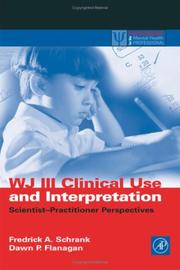
ISBN: 1280927097 9786610927098 1417556048 0080492452 0126289824 9780126289824 9781417556045 1592784747 9781592784745 Year: 2003 Publisher: San Diego, Calif. : Academic Press,
Abstract | Keywords | Export | Availability | Bookmark
 Loading...
Loading...Choose an application
- Reference Manager
- EndNote
- RefWorks (Direct export to RefWorks)
WJ III Clinical Use and Interpretation presents a wide variety of clinical applications of the WJ III from leading experts. Each chapter will provide the reader with insights into patterns of cluster and test scores from both the WJ III Tests of Cognitive Abilities and WJ III Tests of Achievement that can assist with interpretation and formulation of diagnostic hypotheses for clinical practice. WJ III Clinical Use and Interpretation provides expert guidance for using the WJ III with individuals with a broad array of learning and neuropsychological problems, includin
Woodcock-Johnson Tests of Cognitive Ability. --- Intelligence tests. --- Intelligence levels --- Intelligence testing --- IQ tests --- Mental tests --- WJTCA (Psychology) --- Testing --- Psychological tests --- Cognition --- Intelligence tests --- #KVHB:Psychodiagnostiek --- #KVHB:Woodcock-Johnson --- #KVHB:Test; cognitieve vaardigheden
Book
ISBN: 0128157453 0128157445 9780128157442 Year: 2019 Publisher: San Diego, CA: Elsevier,
Abstract | Keywords | Export | Availability | Bookmark
 Loading...
Loading...Choose an application
- Reference Manager
- EndNote
- RefWorks (Direct export to RefWorks)
WISC-V: Clinical Use and Interpretation, Second Edition provides practical information for clinicians on the selection of subtest measures, along with their proper administration and interpretation. Full Scale IQ is identified as important for predicting relevant behaviors and primary index scores for characterizing the child’s strengths and weaknesses. Classroom indicators of low scores on each of these abilities are identified, with suggested interventions, accommodations and instructional strategies for low scorers. Coverage includes ethnic differences for the Full Scale IQ and each primary index score, along with evidence of the profound influence of parental attitudes and expectations. Several other societal and contextual factors relevant to understanding racial/ethnic differences are presented. Two chapters review use of the WISC-V for identifying learning disabilities, testing of individuals with dyslexia, and best-practice recommendations to ensure accurate diagnosis and intervention. Concluding chapters describe advances in the Q-interactive system platform allowing administration of the WISC-V on iPads and other tablets, and how clinicians can tailor assessment using select WISC-V subtests and features
Wechsler Intelligence Scale for Children. --- Intelligence tests. --- Children --- Intelligence Tests. --- Child. --- Adolescent. --- WISC (Intelligence test) --- Adolescents --- Adolescents, Female --- Adolescents, Male --- Teenagers --- Teens --- Adolescence --- Youth --- Adolescent, Female --- Adolescent, Male --- Female Adolescent --- Female Adolescents --- Male Adolescent --- Male Adolescents --- Teen --- Teenager --- Youths --- Minors --- Mental Tests --- Intelligence Test --- Mental Test --- Test, Intelligence --- Test, Mental --- Tests, Intelligence --- Tests, Mental --- Intelligence tests for children --- Intelligence tests --- Psychological tests for children --- Intelligence levels --- Intelligence testing --- IQ tests --- Mental tests --- Psychological tests --- Intelligence testing. --- Testing --- Raven Test --- Raven's Progressive Matrices --- Raven Progressive Matrices --- Ravens Progressive Matrices --- Test, Raven
| Listing 1 - 10 of 11 | << page >> |
Sort by
|

 Search
Search Feedback
Feedback About UniCat
About UniCat  Help
Help News
News